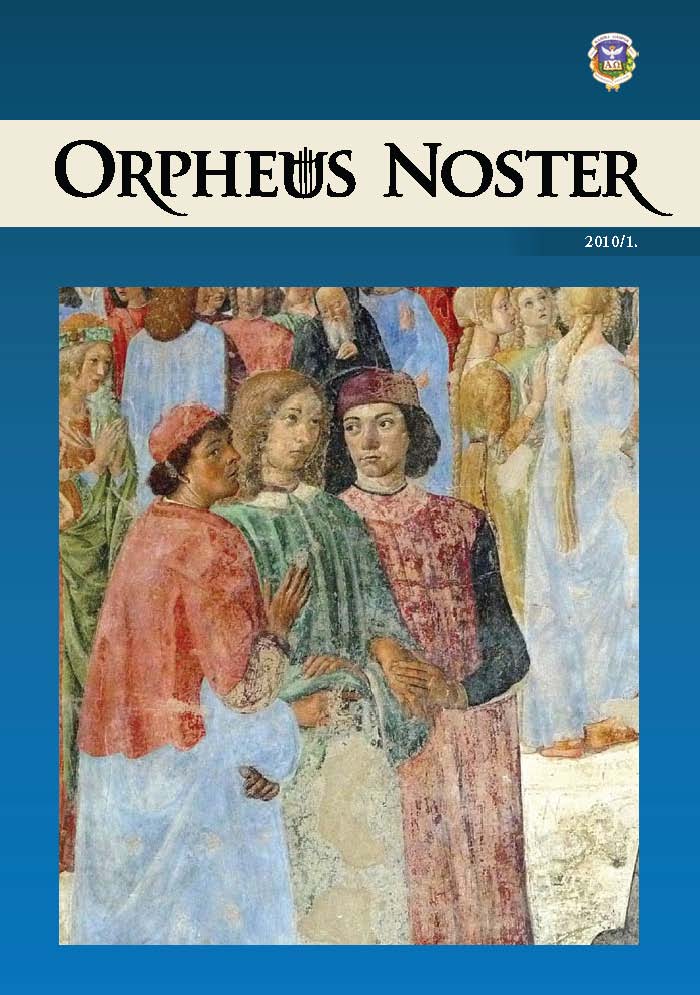
We kindly inform you that, as long as the subject affiliation of our 300.000+ articles is in progress, you might get unsufficient or no results on your third level or second level search. In this case, please broaden your search criteria.

The purpose of this study is to examine Ibn Miskawayh's concept of soul in general terms; more specifically, to analyze the sensory and intellectual perception problems. He deals with the soul in two main lines. The soul as the basis of moral principles; as the subject of sensual and intellectual perception. These two fields can not be separated by sharp lines, however, in this study, the soul concept is studied on the basis of sensory and intellectual problems. Ibn Miskawayh follows Peripatetic philosophers and uses the word ‘soul’ for both the terrestrial region and the celestial region, in the same sense. Ibn Miskawayh's theory of soul is basically based on the Aristotelian tradition. He defines the soul must be the first actuality of a naturally organised body. Soul is the basis of life, vitality and immortality. Soul determines the hierarchical chain of existence, not matter. The soul has different powers for plants, animals and humans, but this does not contrast with the unity and integrity of the soul. Man shares some faculty with plants and animals, but he is separated from other creatures by having intelligence. The sensation, imagination and fantasy are the stages of the material perception level, in man. The mind perceives universal forms. The mind has two tendencies; towards sensation and intelligible world. The mind can only perceives the supreme intelligible forms by turning to its own self. The human soul which is able to obtain intelligible forms and independent of the body is eternal essence and its source is divine.
More...
Jacques Lacan’s ambiguous relation to Continental philosophy provides the perks of restoring the affinity between the “first philosophy” in an Aristotelian sense and Psychoanalysis as a practice, i.e. a re-writing of the subject, while at the same time assuming the failure of the so-called Metaphysical modern subject. According to Lacan, the redefined clinical Anxiety and the Freudian Unheimlich that indicate the Real as an impossible, prove the error of Descartes, who claimed to have forged a knowledge (savoir) based on the cogito. Therefore, the last revolution of Modern Philosophy would be the one of Lacanian psychoanalysis, bearing the mark of the Unconscious, of the object a and of the Thing (das Ding), reenacted within the confines of radical lack
More...
This paper could be regarded as an effort towards a philosophical interpretation based on chapters XXIII to XXV of Seminar III – The Psychoses by Jacques Lacan. Itis structured following Lacan’s line of thought and argumentation as it can be traced in the afore mentioned chapters of Book III. Lacan aims at determining the specific markers of psychosis by a careful examination of the famous case of Daniel Paul Schreber, the distinguished German jurist from the 19th century who has gone mad. At the origin of the constitution of the subject’s psychic structure there is this fundamental, pre-linguistic experience of the rapport to the presence of the radical Other (A) - an experience which in turn determines the subject’s symbolic structure. Essentially there are two possible modes of positioning: the future subject can choose to put itself in a position of receptivity - this would be the Freudian Bejahung – or it can choose to radically reject this presence (the dimension of the signifier in its radical otherness) – this being the Freudian Verwerfung or the Lacanian foreclosure. In the latter case something as a psychotic structure emerges. A fundamental or a rather exceptional signifier has thus been rejected; in Schreber’s or any psychotic’s case it is the paternal signifier (Name-of-the-Father) as the principle of revelation, particularly the principle of procreation. The crucial moment of the triggering of (of) the Schreberian psychosis is when the subject finds itself confronted with a fundamental signifier, which emanates as an interpellation from the radical Other (A) but cannot be accommodated by an already established subjective structure.
More...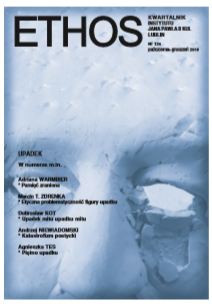
The article presents metaphorically understood falls of the twentieth-century art described in such terms as the ‘speechless image,’ the ‘absorption of the ugly,’ the ‘abandonment of art,’ the ‘end of art,’ the ‘lost image,’ the ‘lost experience.’ Philosophical views of Hans-Georg Gadamer, Theodor W. Adorno, Arthur C. Danto, Jacques Ranciere, and Wolfgang Welsh have been juxtaposed with interpretations of works of such artists as Mark Rothko, Marcel Duchamp, Artur Zmijewski, Andy Warhol, Robert Rauschenberg, and Janusz Orbitowski. The analyses reveal a longing for metaphysics accompanying the described ‘falls’ of art. The theories advanced in relation to such ‘falls’ show the qualities inherent in the art in question, e.g., silence and moderation, the ‘lust of existence,’ paradox, poetry and its beauty, words which interpret art, the sublimity of infinity. In conclusion, the author points to the impossibility of avoiding metaphysics in art.
More...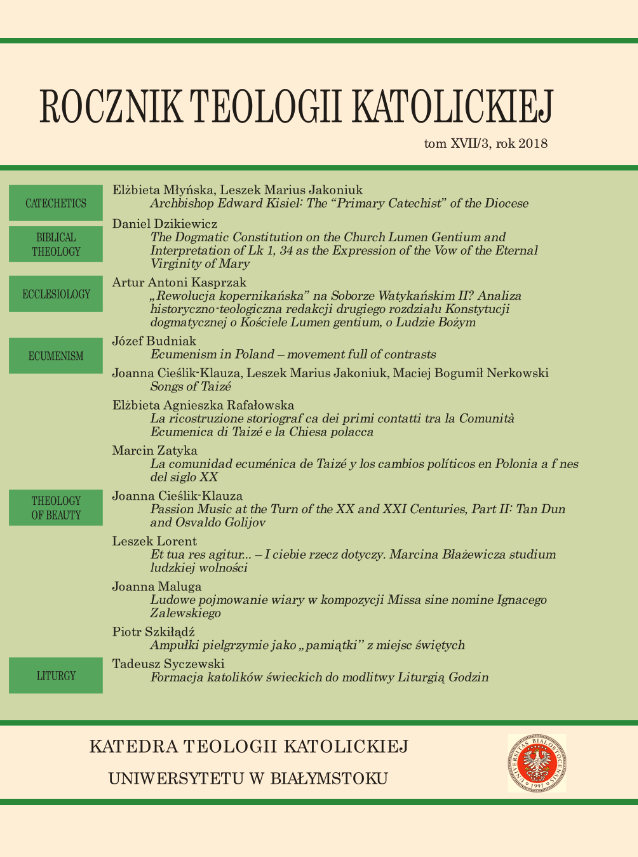
As a personal being, man needs contact with other people in order to fully and properly flourish both personally and socially. This imperative impels man to go “beyond” others and to seek contact with a Transcendental Being, meaning God. Contact with God gives man a sense of safety that enables him to come to know the norms of behavior that stabilize human existence and make proper interpersonal relationships possible. In contemporary society, however, man has departed from this concept, he lives “without God,” and is no longer “open to God.” Religious and moral indifferentism, or living “as if God does not exist,” is a manifestation of such an attitude. When treated as the highest value, materialism becomes the axiological orientation of human existence, which results in the degradation of religious and moral life and threatens social and civic order. This article examines this issue by focusing on two dimensions: 1) the degradation of religious and moral life as a contemporary phenomenon, and 2) the threat to social and civic order that results from religious and moral indifferentism.
More...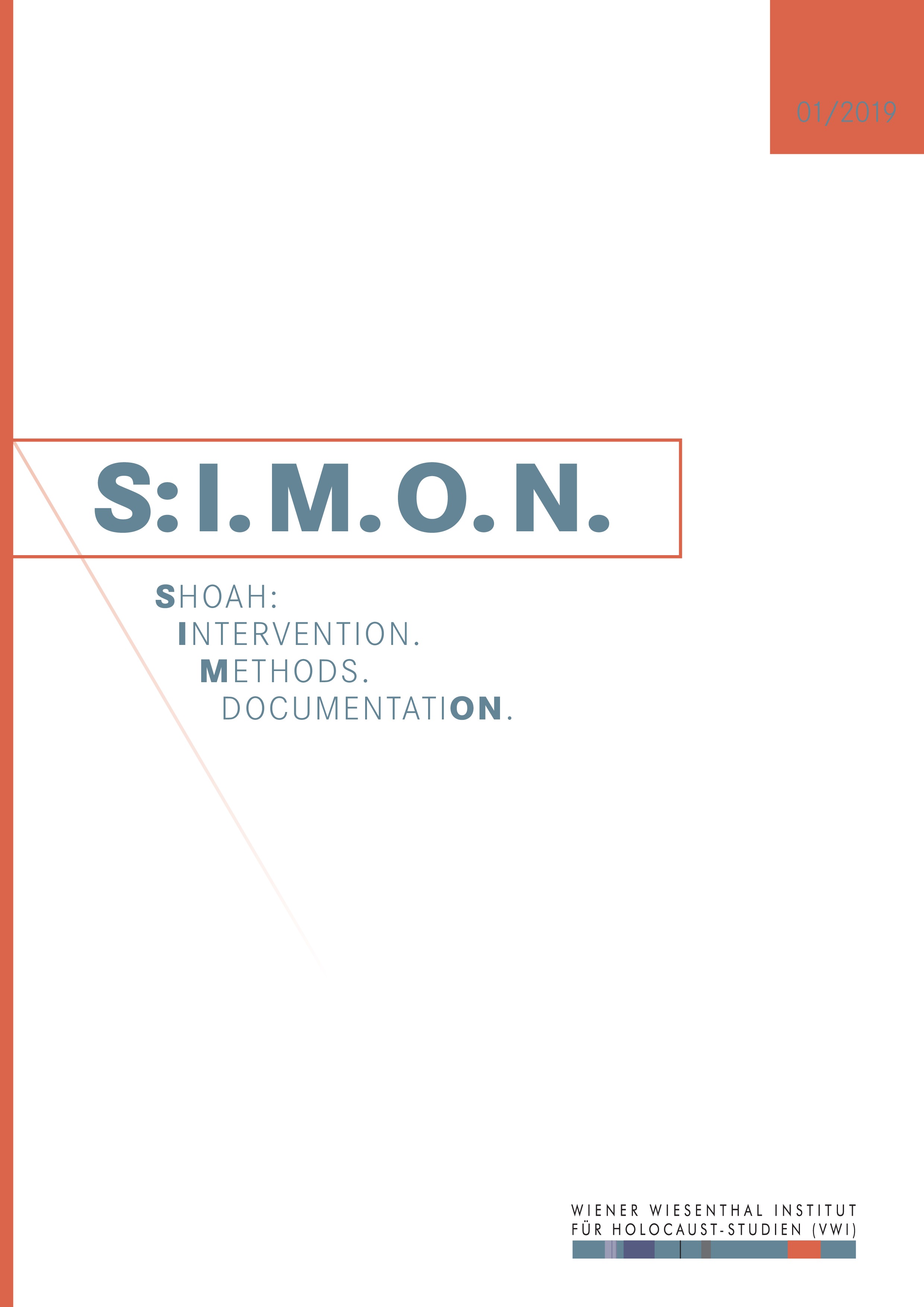
This lecture addresses how “bearing witness to genocide” became a central trope of contemporary Western moral culture. The 1960/61 trial of Adolf Eichmann in Jerusalem put victims of genocide centre-stage and affirmed the pre-eminence of the Jewish Holocaust survivor in European and especially American politics and culture. The lecture revisits the Eichmann trial to understand its contribution not simply to bringing the world’s attention to the Jewish dimension of the Holocaust, but also to understanding how the trial shaped the pervasive figure of the Jewish “witness” who marked the Holocaust as a caesura in human history. The Holocaust survivor remained the iconic witness even when, after the 1990s, the witness to genocide became a more generic symbol of suffering humanity in the shadow of all state-sponsored mass violence against persons and cultures. The lecture suggests that only by placing the witness to genocide in a longer historical trajectory can we understand why the Holocaust remains iconic in spite of the occurrence of many other genocides since.
More...
The movie Shoah from the intellectual, filmmaker, editor of «Les Temps Modernes» and former Résistance-fighter Claude Lanzmann, who recently passed away, presented for important parts of my generation in Germany a radical turning point. For the first time we had been able to conceive that the destruction of the European Jews took place almost in immediate geographic and historical neighborhood. In one shot it got clear to us –who understood ourselves as student activists with a critical posture towards capitalism and domination– that in reality we hadn't known nothing about the Shoah.
More...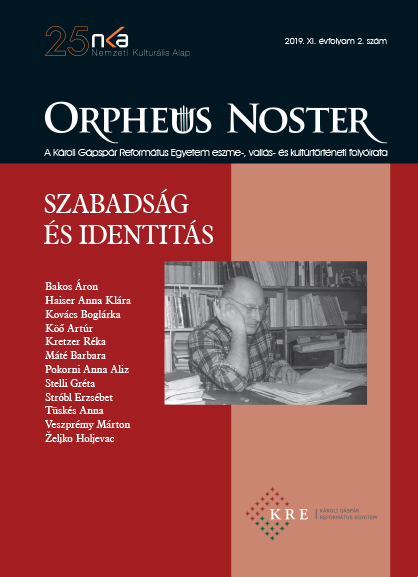
The story of The Grand Inquisitor is where, according to Berdyaev, the idea of a government that aims to replace religion starts to take shape. Th ose in power claim that only they hold the key to true happiness. However, their tutelage over the citizens is combined with a sense of superiority. In exchange for the care they provide, they expect individuals to abandon their freedom, although the happiness off ered in return is a childish one: without freedom, individuals lose all that defines them. A government that advertises obligatory and compulsory happiness for everyone in fact promotes the rejection of personality and freedom. To Berdyaev, socialism is realised through the activity of countless petty inquisitors, and through the acceptance of the three temptations and their consequences.
More...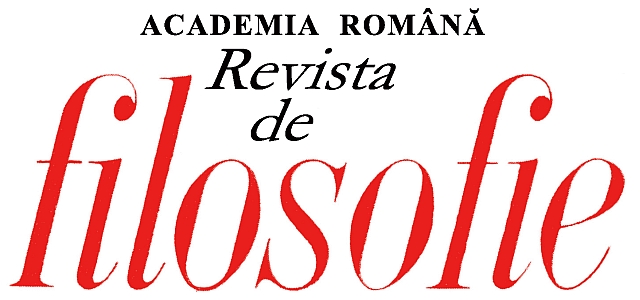
This article outlines the efforts of the Western philosophers to find the hidden unity lying behind the world of the opposites. It starts by discussing the Pre-Socratic concept of an original matter. Here such unity was only posited and not yet fully understood. Next, the article addresses the more specific views of Plato, Aristotle, and Plotinus, who endeavored to explain the persistence of the real forms within the decaying world. Finally, it presents the way in which Christianity elaborated a new concept of the divine Creator that marked both the Western medieval tradition and the European modernity radically.
More...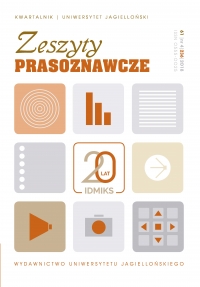
The text presents the figure of an extraordinary scholar, Ignacy S. Fiut. It shows him not only as a great scientist, but also a sensitive and good man, whose multifaceted personality is reflected in scientific works as well as poetry.
More...
The eastern and western philosophies have elaborated greatly on the issue of conflict, conflict resolution, development, war, peace, etc. The common axis in many of the theories is the human factor, the way the individual perceives and is affected by these phenomena. In these theories there is an attempt to establish a working connection between the practical and the ideal. While conflict can be either a basis for societal development or non development, it also substantiates a perspective for the existence of values which are eventually intrinsic to political and moral improvements. Such values aim at the direction of prosperity and wellbeing, which remains an ecumenical and diachronic problem, not only under economic terms. Human societies are still faced with the dilemma, whether material progress is the fast track to the resolution on conflict. However, what is still disregarded, as shown in comparative philosophical literature, is that development has to take into consideration a richer notion of the human being; one concerned with elements of his inner reality. In that sense, development is the aftermath not only of the avoidance of war or conflict but of the enrichment of human life and action with certain advancements in individual and collective virtues, advancements that offer macroscopically benefit to the political.
More...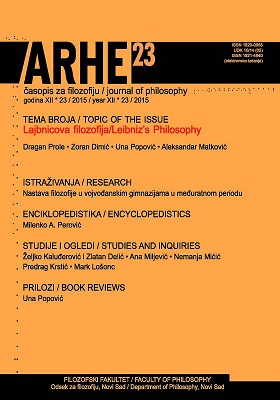
Naša filozofska kultura dugo je trajala u znaku nedostatka brojnih neophodnih elemenata. Nedostajala su sistematska istraživanja nacionalne filozofske baštine. Malo je knjiga, studija, ogleda, prevoda i bibliografija koji bi u svom misaonom i istraživačkom središtu imale problematiku filozofske propedeutike, metodike i didaktike filozofije, kao i same istorije filozofije. Objašnjenje za takvo stanje delom se može naći u odsustvu volje među filozofskim delatnicima za „podelom rada”. Ona je iznova ohrabrivana uveravanjima da ti elementi filozofske kulture spadaju u rubna područja filozofske „infrastrukture”. [...]
More...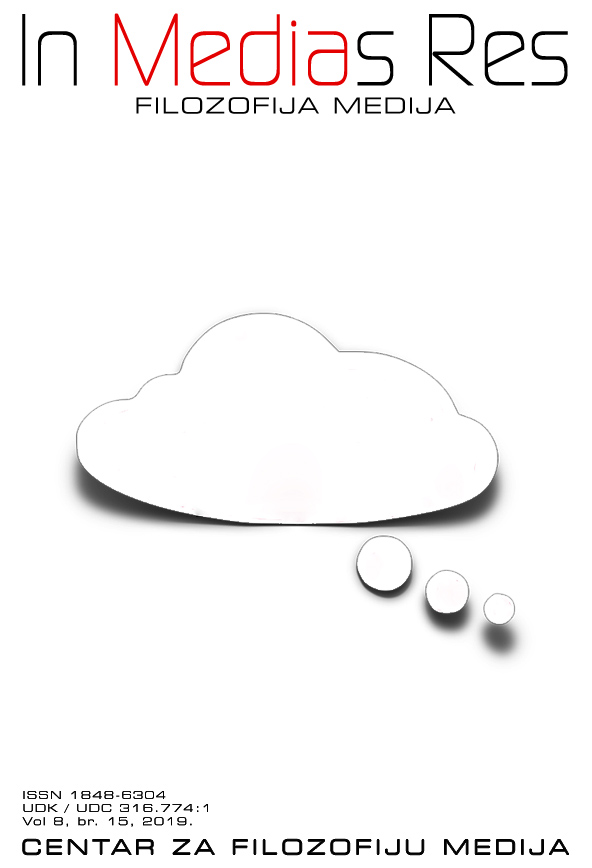
The presentation deals with the issue of media imperialism and racism in the novel Americanah (2013) by Chimamanda Ngozi Adichie, Nigerian novelist and writer. The paper starts from the position of electronic colonialism theory about danger of seductive media content. Violent media propaganda and transcription of western media content in Nigerian mass media affects the abandonment of African cultural patterns and forcibly changing behaviors of domicile population. Characters in the Adichie’s novel are great example of the mind colonization and westernization that is followed through the media. In the presentation we will show how media imperialism led to racial fetishism and losing pre-colonial values in african society.
More...
The phenomenon of fake news and unverified information represents a serious challenge to modern media, especially online media where ethical relativism has become the accepted norm, and truth is often suppressed under commercial values. In 2016 the political establishment of the United States and the EU for the first time had to face the fact that the communication revolution has been speeding up the spread of lies and misinformation, and the dominant liberal system of social values uncritically supported by mainstream media has actually been losing supporters. Are fake news merely part of Russian propaganda and hybrid wars started with the aim of undermining the values of western democracies or are the most influential liberal media the main sources of fake and biased news? This work analyses the reasons why traditional media, even in their online form, have lost their crucial impact on creating public opinion and consequently on directing social processes.
More...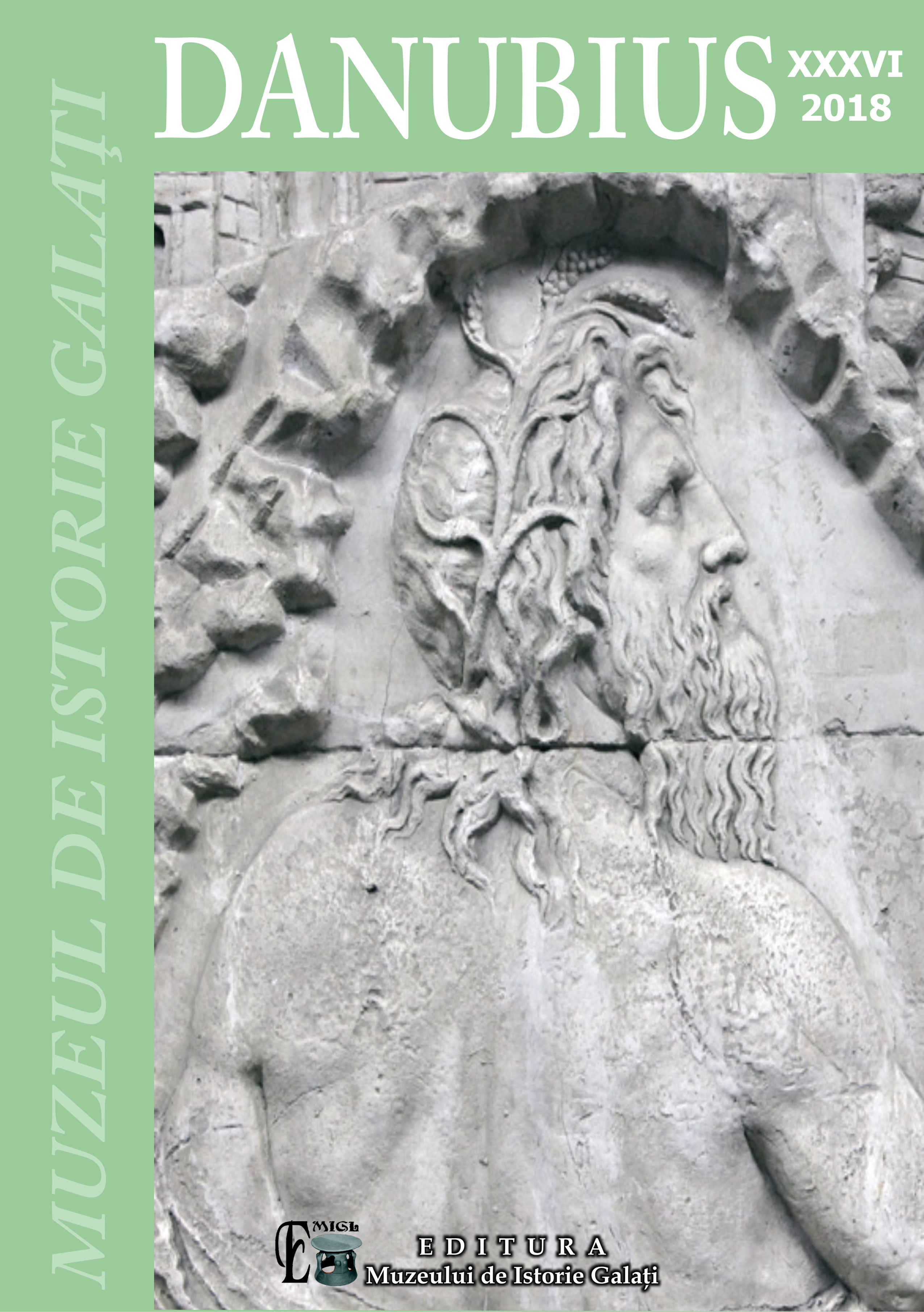
The Ch’un-ch’iu (Chunqiu) or Annals of the Spring-Autumn Period had been indited according to the textual pattern of a Court chronicle which describes the autocratic regime of the twelve dukes who governed the State of Lu from the Shan-tung (Shandong) region, a vassal-state of the Eastern Chou (Zhou) dynasty (770-256 B. C. E.), during the period 722-481 B. C. E.. The syntagm “Spring-Autumn” is a standard synecdoche which designates an entire calendarial year, or, through a semantic extension, a chronicle the textual continuity of which is structured according to the calendarial continuity of the yearly intervals which include diplomatic dialogues, political intrigues and feudal wars, in the framework of the relationships developed by the State of Lu with the neighboring states, as well as testimonies concerning eclipses, floods, earthquakes and wonders of nature.The decadence of the Chu-hsia (Zhu Xia) civilization, under the Eastern Chou (Zhou) dynasty (770-256 B. C. E.), could have been prevented only through the establishment of a new political order, conformably to the Confucianist ritual ideal, capable to mirror the celestial will in the rigors of an ascetical monarchic regime and in the necessity of the rectification of names (cheng-ming; zhengming).In spite of the fact that he defended the political-moral order of the Eastern Chou (Zhou) dynasty, Confucius traversed the experience of the disintegration of this order and of the transition towards an unknown epoch. Even if he was a loyal subject of the State of Lu, Confucius was forced to to admit that Lu “has only the name, not the substance of a great State”, and the ideal of the rectification of names (cheng-ming; zhengming) did not mold in a lasting manner the immediate historical time. The purity of the unicorn did not preserve his liberty as against the violence of the hunters, its wonderful nature did not preserve his existence as against the ignorance and brutality of human beings. The coming of the unicorn presaged, simultaneously, Confucius’ unfulfilment as a statesman, his imminent death and his investiture as an “uncrowned monarch” (su-wang; suwang).
More...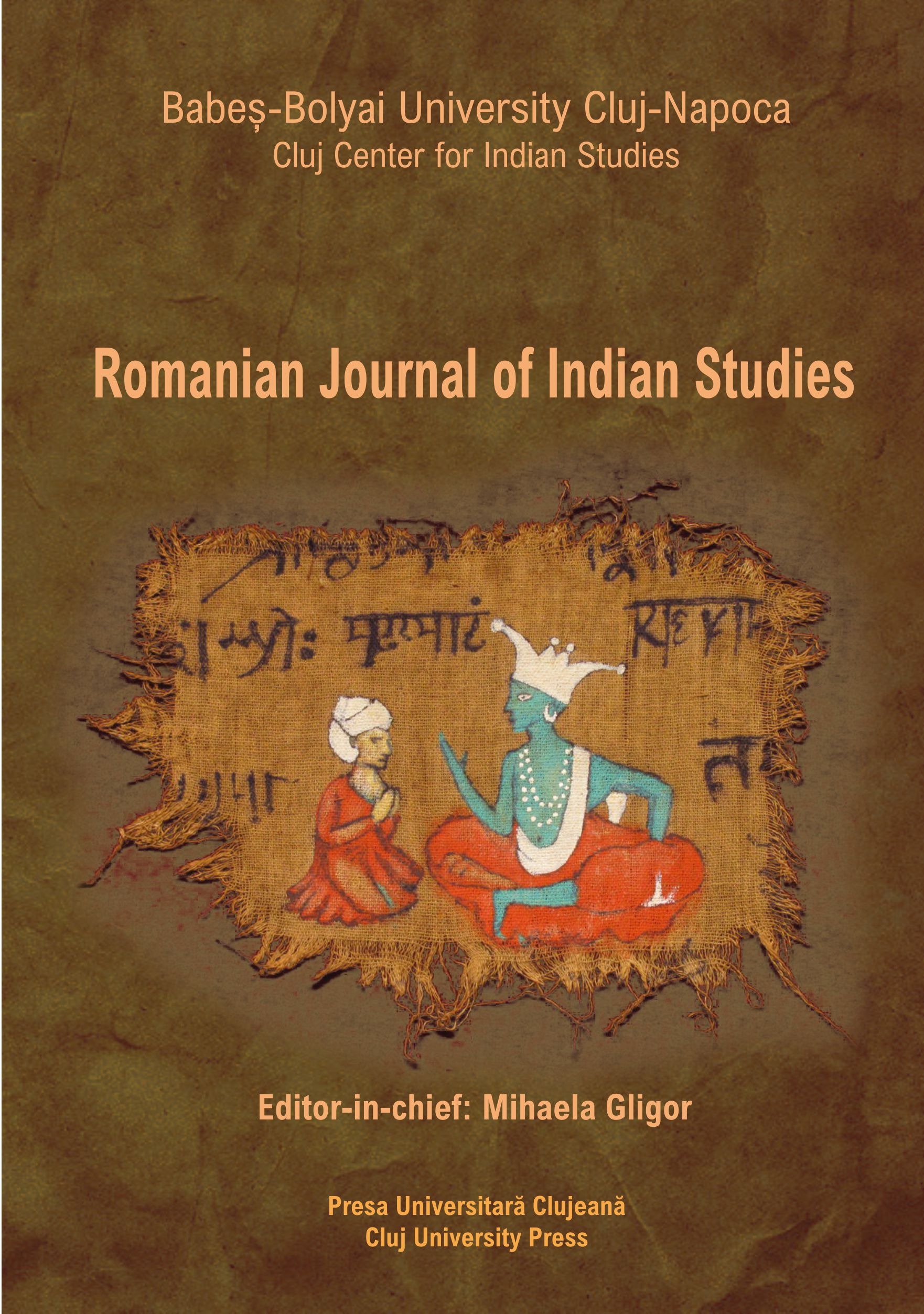
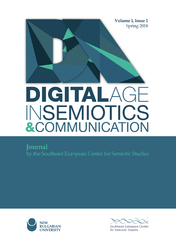
Recently, a peculiar narrative configuration has developed and is spreading through the internet culture and new media. Characterised by a specific representation of the individual growth process, Apeiron narratives find their origin in pen & paper role-playing games, but it is only after the development of digital games and the diffusion of the Japanese cultural codex through the contemporary mediascape that they have become a coherent, autonomous and viral phenomenon. In the following pages, this narrative configuration will be described through a series of paradigmatic examples; its roots will be traced back to the peculiar traits of role-playing games, and the importance of recent digital adaptation will be highlighted. Finally, I will describe its diffusion beyond the domain of fictional text, hinting at possible environments for its diffusion.
More...
The relation between the humanities and information technologies has become so strong in recent decades that it is no longer possible to see this relationship as a mere temporary phenomenon. Together with massive digitalization of books, journals and other texts, collected into extensive electronic libraries and hypertextual databases, it is now necessary to rethink and redefine not only the concept of reading, but to specify new possibilities for analysing literary and specialized texts. The aim of this study is to point at new approaches to reading large text collections in the light of Moretti’s method of distant reading. This paper uses the methodological issues of relation between distant reading and Russian formalism as background for this consideration.
More...
Facebook offers great opportunities for brands to connect with customers and build relationships with them in order to increase their loyalty and the company’s sales. In regards to these goals, one of the most important key performance indicators is the customers’ activity – liking, commenting, sharing, recommending, expressing love, etc. On one hand, there is a lot of research on customers’ engagement, behavior and motivation. These studies provide valuable information for marketers to understand the way in which individuals use the social network and interact with others as well as the reasons behind their actions. Based on this knowledge they can develop their communication strategies and create content which has impact on the target audience. On the other, there are still some research gaps which can be further explored. One of them is related to the impact of one of the most important company assets – the brand culture, on the customer’s behavior and willingness to become part of the digital brand story. This paper presents a Facebook brand page users typology, developed by using a semiotic approach, which is based on their brand culture adoption and brand narrative engagement.
More...